
Discover the average cobblestone driveway cost based on factors like the size and scope. Keep reading to budget for a cobblestone driveway.
Pave the way to a perfect-sized driveway


A 1-car driveway should be 10 to 12 feet wide.
A 2-car driveway should be 20 to 24 feet wide.
The ideal driveway depth is 6 inches.
Make sure to follow local building codes when planning a driveway.
Hire a local paving pro to ensure your driveway has drainage and stability.
Whether you’re building a new driveway or replacing an existing one, it’s important to know how wide it should be. A 1-car, 2-car, and turnaround driveway all have different guidelines, and you'll need to ensure it meets local code. Learn all about standard driveway widths, the width of two-car driveways, and more.
The standard driveway width for a single-car driveway is 10 to 12 feet wide. This allows for any type of vehicle to fit comfortably, from a car to an SUV or van. While some municipalities may allow for driveways to be as narrow as 8 or 9 feet, it can be difficult for even standard-size cars to get in and out. With a driveway less than 10 feet wide, passengers often have to step out into the grass or on uneven terrain when exiting the vehicle. If you live in the city, pay extra attention to local ordinances about the width of driveways and driveway aprons.
Depending on your city's ordinances, the minimum driveway width can be as low as 8 or 9 feet. A 9-foot driveway is tight for vehicles and often means people step out onto the grass or in the landscaping when exiting the vehicle. Most homeowners and contractors aim for a 10-foot minimum, but it's up to personal preference, your lot size, and your budget.
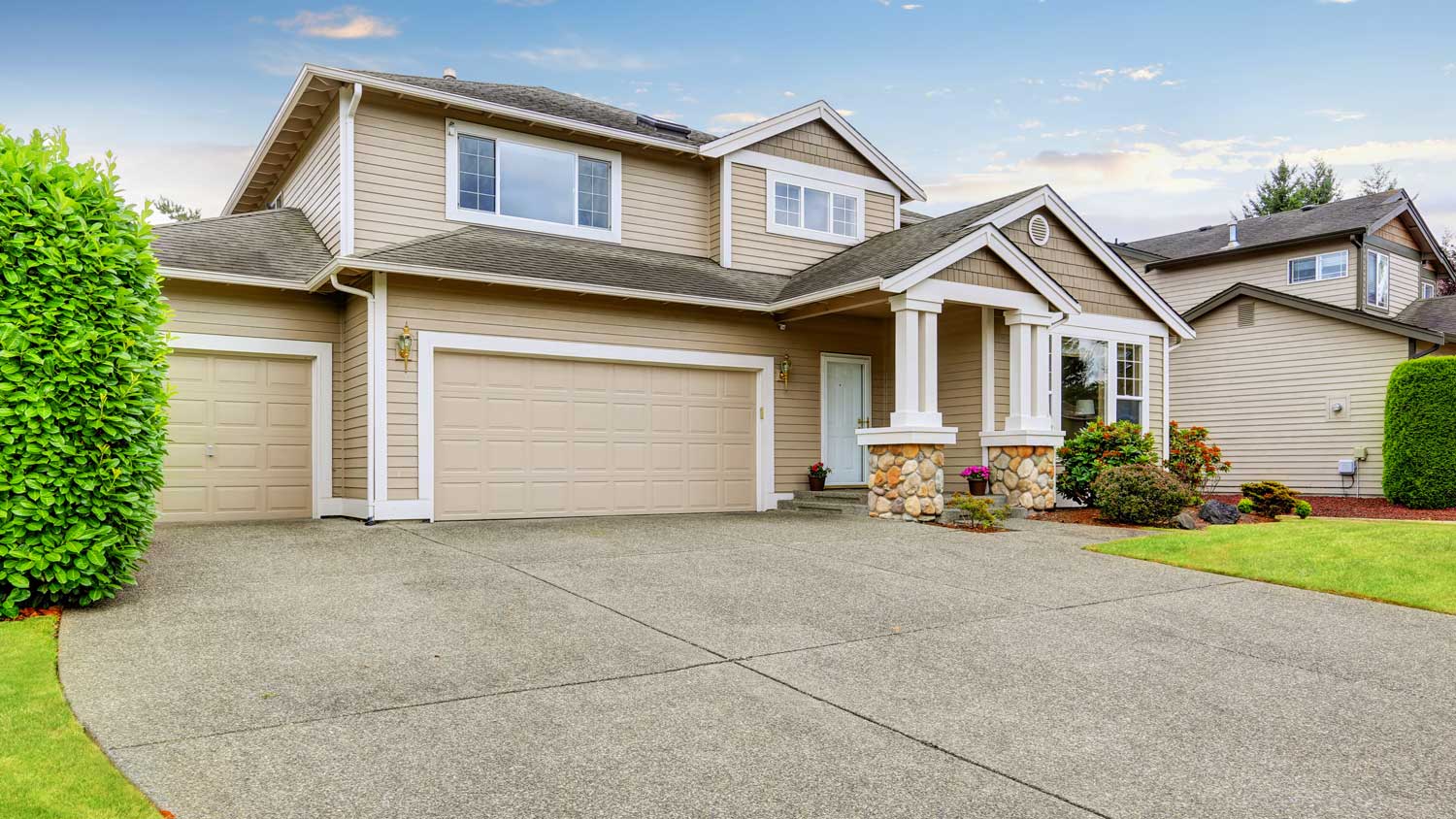
The width of a 2-car driveway is 20 to 24 feet. A 20-foot-wide driveway allows two cars to pass by each other but doesn't give enough space to open the doors side-by-side. A 24-foot driveway allows two parked cars to open their doors next to each other.
Many municipalities have regulations about the width of driveway openings, especially if you're in the city. Make sure your contractor is familiar with the local code. One option is to start your driveway with a single-car opening (driveway apron) and expand it to a 2-car driveway nearer to the home as code allows.
The width of a 3-car driveway is typically 30 to 36 feet to allow three vehicles to park side-by-side. A 36-foot wide driveway gives space for the drivers and passengers to open the doors and walk around the vehicles. Ensure that your municipality allows for 3-car driveways, especially at the opening where it meets the street. You also want to make sure that you follow code about how close your driveway is to the lot line.
For a circular, horseshoe, or turnaround driveway, plan for a minimum width of 12 feet, but likely more. You want to ensure any vehicle has the proper turning radius. A vehicle should have space to turn around without worrying about running off the driveway onto the grass or landscaping.
Put together a detailed plan with a driveway contractor or landscape architect to ensure you have the right dimensions for any car. A pro should also consider the size of your lot and local driveway regulations.
If you have a driveway with walls along the edges, factor in one to two feet of extra space on either side beyond the standard driveway width. You’ll have space to open your car doors without scratching them against the wall. You can pave the extra space or leave it unpaved.
Beyond the width of your driveway, you’ll want to keep in mind the length, depth, and type of driveway material. Knowing all the dimensions of your driveway can help you plan a budget and find the right contractor.
The length of your driveway depends on how far your home is from the road. Make sure to follow any local ordinances about the length of the driveway and regulations for where to put it on the lot. There may also be extra guidelines about parking spaces and poured spaces. For instance, some ordinances might say that your driveway has to be at least 8 feet in from the property line.
For a stable driveway with proper drainage, you'll need certain base layers and thickness of your top material. For asphalt driveways, the minimum depth is 2 inches but many homeowners opt for 6 inches of depth for stability. A typical concrete driveway is four inches deep but can go up to 8 inches depending on how heavy your vehicles are and how much traffic your driveway sees.
You should get a 4 inch driveway for concrete and 6 inches for asphalt to ensure stability and longevity. You can pour up to 8 inches of either material for extra stability, especially if you have heavy vehicles or more than one car. The thicker the driveway, the longer it tends to last.
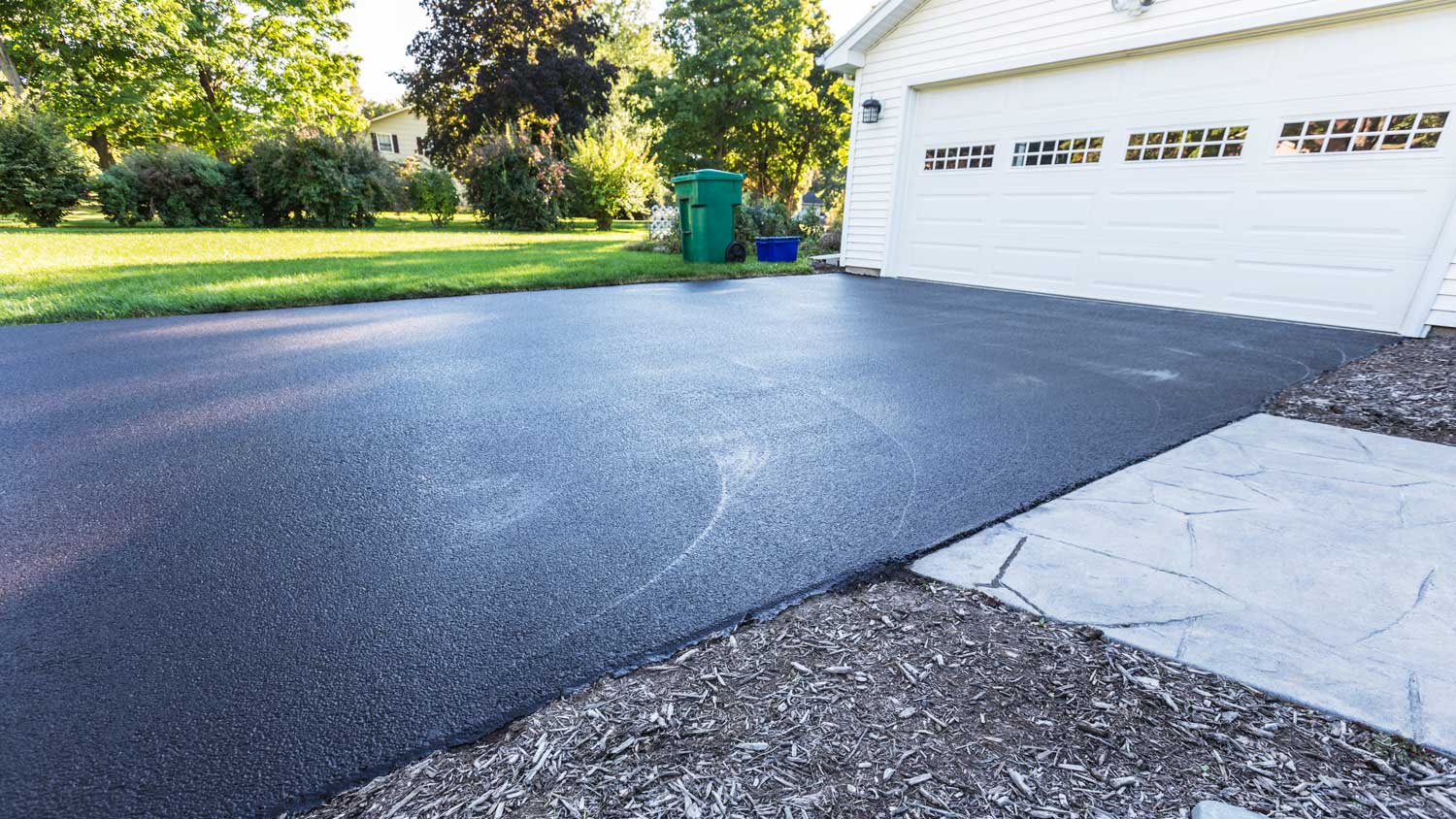
Choosing your material is just as important as choosing the width and length of your driveway.
Here’s a breakdown of the cost, lifespan, and maintenance requirements of various types of driveway materials.
Cost: $4 to $15 per square foot
Lifespan: 30 years
Maintenance: Routine washing, patching cracks or holes
Cost: $7 to $15 per square foot
Lifespan: 20-30 years
Maintenance: Routine washing, patching cracks or holes
Cost: $1.25 to $1.80 per square foot
Lifespan: Varies
Maintenance: Regular raking, adding more gravel as needed
Cost: Higher than concrete and asphalt
Lifespan: 20-25 years
Maintenance: Routine washing, replacing individual pavers as needed
Cost: Higher than pavers
Lifespan: Indefinitely
Maintenance: Routine washing, replacing individual stones as needed
Cost: Higher than standard materials
Lifespan: Varies
Maintenance: Depends on the specific material used
While common driveway materials are designed to be rugged, some options last longer than others on average. Keep in mind that everything from the local climate to the amount of wear and tear a household puts on a driveway can influence longevity. Here's a look at how long you can expect popular driveway materials to last before needing to be replaced:
Concrete: 30 years
Asphalt: 20-30 years
Pavers: 20-25 years
Cobblestone: Indefinitely
Averages for how long different driveway materials are expected to last assume that the homeowner is taking all proper maintenance steps for the specific material that's been installed at their home. This can include routine washing and patching any cracks or holes as soon as they are detected. Keep in mind that many driveway materials can only be safely filled in or patched when outdoor temperatures are stable at 30 degrees Fahrenheit or above. Factors that can contribute to the premature aging of driveways include parking heavy vehicles on a driveway, allowing oil from vehicles to drip onto a driveway, plowing and salting in high-snowfall climates, or having a property that is susceptible to erosion.
The standard driveway size is 10 feet to 12 feet wide by 18 feet to 20 feet long. These dimensions ensure that most standard pickup trucks and SUVs can be comfortably parked. When choosing the correct dimensions for your driveway, it's important to consider your property, neighborhood, and lifestyle habits.
The first step is considering your garage. If your home has a single-car garage, your driveway width will typically be 10 feet to 12 feet. For double-car garages, the width should reach 20 feet to 24 feet.
If your neighborhood is under zoning laws or HOA rules that dictate minimum and maximum driveway opening sizes, you'll need to work within those parameters. Most areas restrict homeowners from installing driveways that are narrower than 9 feet wide. If you have more freedom, you'll need to select your dimensions based on how you use your driveway. If your home is located on a main road that doesn't allow for much street parking for guests, consider installing a wider or bumped-out driveway that offers extra parking. In general, each parking spot on a driveway will need to be able to offer at least 9 feet by 18 feet per vehicle to allow for turnaround room. If you plan to use your driveway for long-term parking for a work truck, delivery van, RV, or trailer, opt for a 12-foot-wide driveway instead of going with 10 feet. Length should be a minimum of 30 feet.
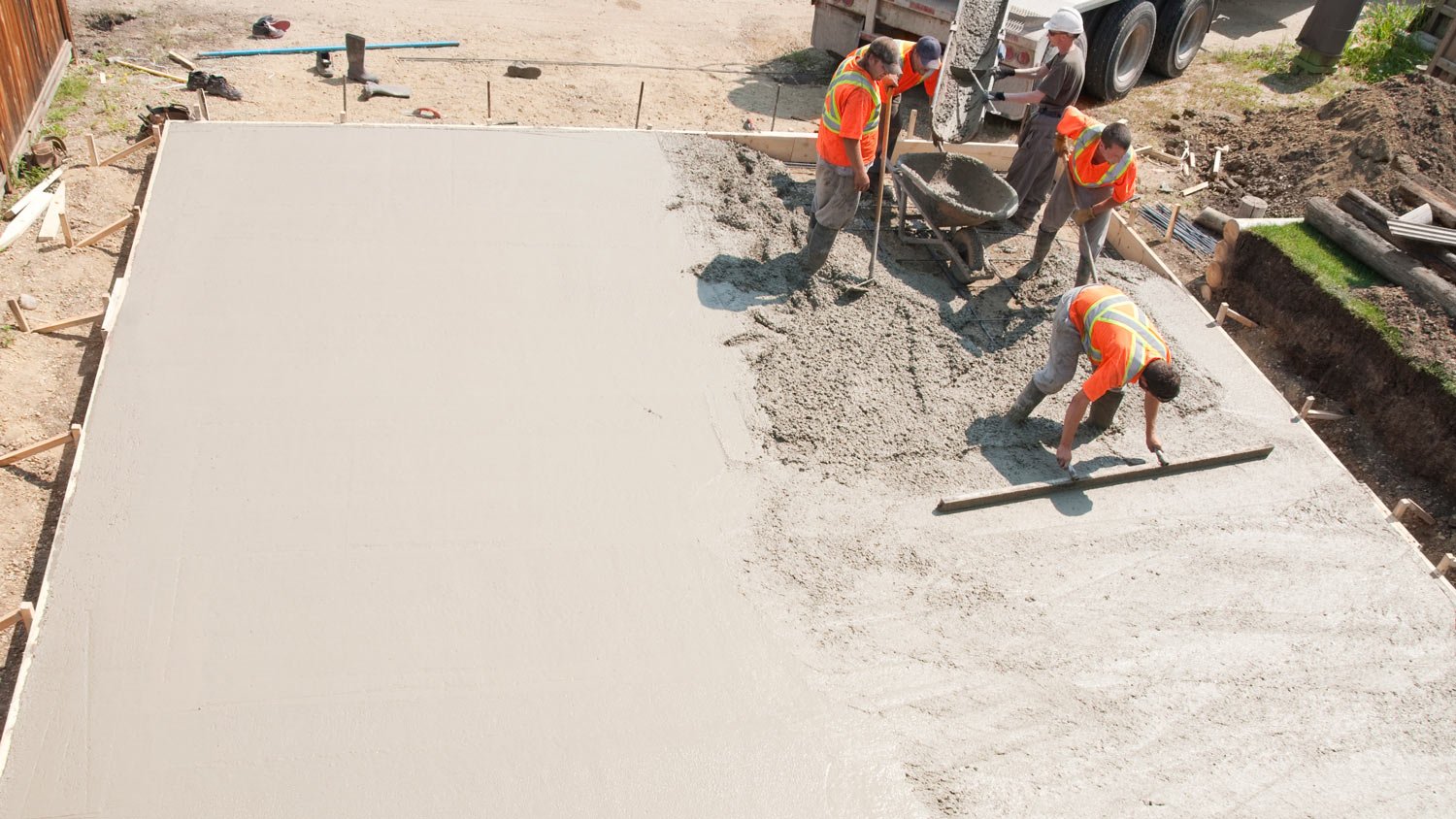
Installing a new driveway, no matter the material, is a huge undertaking. It can often be back-breaking work, especially if you don't have specialty tools or a background in pouring concrete or asphalt. Have a local driveway paving company handle the project to ensure the driveway is level, stable, and meets code. A pro also looks out for underground utilities, water lines, and in-ground sprinklers. The cost to pave a driveway runs about $4,500 on average. The cost to repave a driveway ranges from $1,400 and $12,100.
From average costs to expert advice, get all the answers you need to get your job done.

Discover the average cobblestone driveway cost based on factors like the size and scope. Keep reading to budget for a cobblestone driveway.

The cost of a tar and chip driveway falls between gravel and asphalt. Is this unique process the happy medium you've been looking for? Let's take a look.
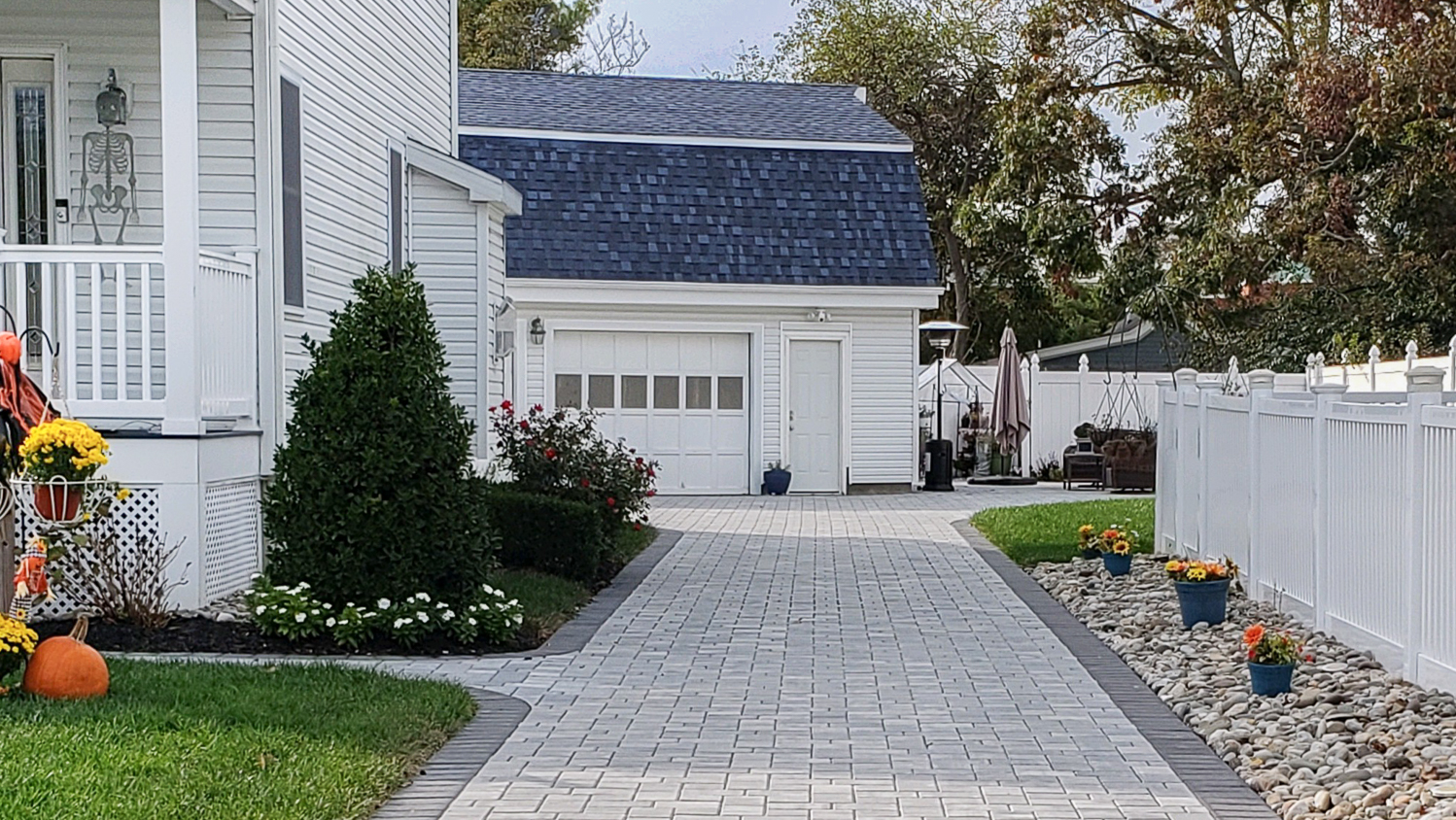
Discover the average paver driveway cost, including price ranges, key cost factors, and tips to help you budget for your driveway project.

Detergent, baking soda, oil stain removers, and more can clear a driveway oil stain. Read this guide on how to remove oil stains from your driveway like a pro.
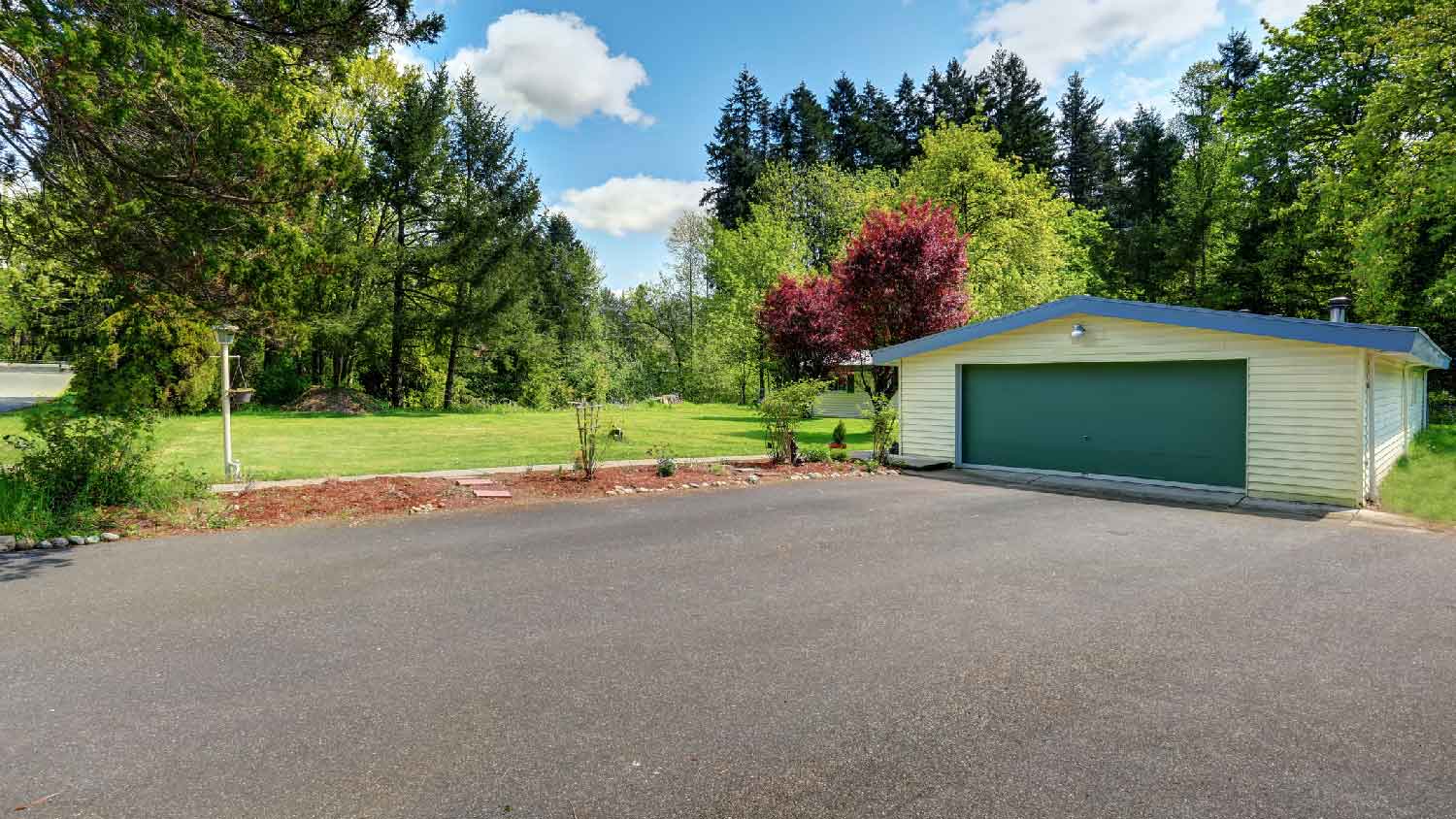
This article reveals the 6 most common types of asphalt cracks, their causes, and the best solutions to prevent further damage.

Our eight gravel driveway maintenance tips, including raking and spraying, make it easy to keep your gravel driveway looking good and functioning properly.